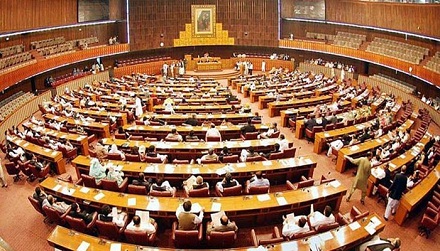KARACHI: Pakistan Stock Exchange above the 98,000 mark on Friday as share prices surged more than 2,000 points in intraday trade
ISLAMABAD: Military and intelligence leaders on Thursday called for avoiding divisive politics on issues of national interest as they cautioned that strategic challenges and related policy shift in external relations could have repercussions for the country.
This was the crux of a briefing given by Inter-Services Intelligence (IS) Director General Lt Gen Faiz Hameed to the Parliamentary Committee on National Security on the spectrum of possible threats and the regional environment — the situation emerging in Afghanistan after the withdrawal of foreign forces from there and the stalemate in peace talks, the developments in Occupied Jammu and Kashmir, and US efforts to contain China, according to a source privy to the proceedings.
Army Chief Gen Qamar Bajwa also attended the session and responded to questions of the parliamentarians.
The meeting, besides the members of the committee that comprises parliamentary leaders of the parties represented in both houses, was also attended by some of the leading figures from both the treasury and opposition benches and the provincial chief ministers.
The government, the participants of the meeting were told, had taken a major decision on pursuing ties with other countries on the basis of equality. Moreover, a policy decision on not becoming part of any conflict had been taken.
It should be recalled that the government had turned down a US request for setting up of drone bases in Pakistan for future counterterrorism operations in Afghanistan. Prime Minister Imran Khan had in his speech at the conclusion of the budget session said that Pakistan could be partner with the United States in peace, but not in conflict.
The participants were told that external forces had already started exerting pressure on Pakistan. It was said that Pakistan was not only kept on the Financial Action Task Force’s (FATF) grey list despite implementing 26 of the 27 points of the action plan agreed with the illicit financing watchdog, but the goal post had also been changed.
Islamabad has now been told to additionally implement a separate six-point action plan given by the Asia Pacific Group, a regional affiliate of the FATF.
Proxies, the meeting was told, were also being triggered by external forces as was evident from the increase in terrorism in Balochistan and last week’s explosion in Lahore, according to the source.
The International Monetary Fund, it was said, could in the coming days ramp up pressure on Pakistan and attempts could also be made to target China-Pakistan Economic Corridor (CPEC) projects. It was further apprehended that there could be efforts to scare away foreign investors from Pakistan.
“The participants were briefed on the internal fault lines that could be exploited by the hostile elements,” the source said.
The setting up of National Intelligence Coordination Committee, the liaison body for country’s spy agencies, the meeting was informed, would contribute to developing a wholesome National Intelligence Assessment. The credit of busting of the network involved in Lahore’s Johar Town blast was attributed to enhanced cooperation between intelligence agencies under the NICC.
The political leadership was told that in view of the situation it was critical to maintain consensus on issues of national interest, while politics should be restricted to governance and related political matters.
You May Also Like
TEHRAN: The head of Iran’s Revolutionary Guards described the arrest warrant issued by the International Criminal Court for Israeli Prime
LOWER KURRAM: The death toll in yesterday’s gun attack on passenger vans in Khyber Pakhtunkhwa’s Lower Kurram has risen to 42,






